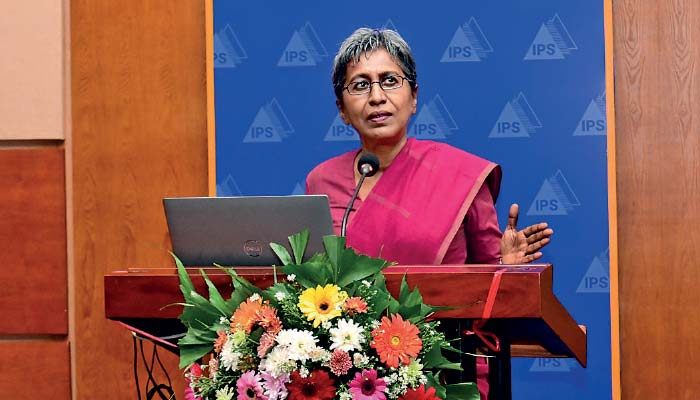Monday Feb 16, 2026
Monday Feb 16, 2026
Thursday, 16 October 2025 06:01 - - {{hitsCtrl.values.hits}}

IPS Executive Director Dr. Dushni Weerakoon- Pic by Sameera Wijesinghe
Sri Lanka must now convert its cyclical post-crisis rebound into a structurally driven growth process, the Institute of Policy Studies (IPS) said yesterday, warning that the country’s recovery will hinge on deeper productivity and efficiency gains as external uncertainties persist.
Releasing its annual Sri Lanka: State of the Economy 2025 report, the IPS said GDP growth of 4.9% in the first half of 2025 reflected the outcomes of a steady and predictable policy environment. However, it noted that sustaining this momentum would depend on structural reforms, particularly in land and labour markets, and greater openness to trade and investment to improve resource allocation.
“At this mid-point of Sri Lanka’s post-crisis recovery, a critical question is what the source of such productivity gains will be. Reforms to tackle rigidities in land and labour markets or opening up to trade and investment help to improve resource allocation and lift productivity,” the IPS said in a statement.
The report said technology infusion and digitalisation could accelerate productivity gains while broader institutional and policy reforms take effect. It highlighted the challenge for policymakers in balancing long-term reform goals with short-term social and economic demands, especially in an economy still recovering from crisis conditions.
National computer literacy remains low at 39%, with sharp disparities such as 17.9% in the estate sector. Yet IPS said the digital economy offers an opportunity to narrow social and regional inequalities if supported by investments in digital access for underprivileged schools, affordable services, and digital literacy programs.
The report cited that 42% of adults in the poorest 40% of households already use digital payments, a trend that could strengthen e-commerce growth and modernise transport and public service delivery. Extending digital tools to agriculture could also reduce costs, improve traceability, and enhance competitiveness in export markets amid global trade uncertainties.
“It bodes well to develop Sri Lanka’s growing e-commerce sector or to improve safety and convenience of the country’s public transport system. Widespread access and scalability through digital channels on extension services can help farmers. In an environment of global trade uncertainties, lowering the costs of doing trade and enhancing export competitiveness through product traceability to meet new regulations in the global market will be distinct advantages,” IPS said.
IPS said embedding such productivity-enhancing technologies into Sri Lanka’s economic model would not only raise efficiency but also support the Government’s objectives for stable and sustained long-term growth as the country prepares to resume its external debt service obligations.